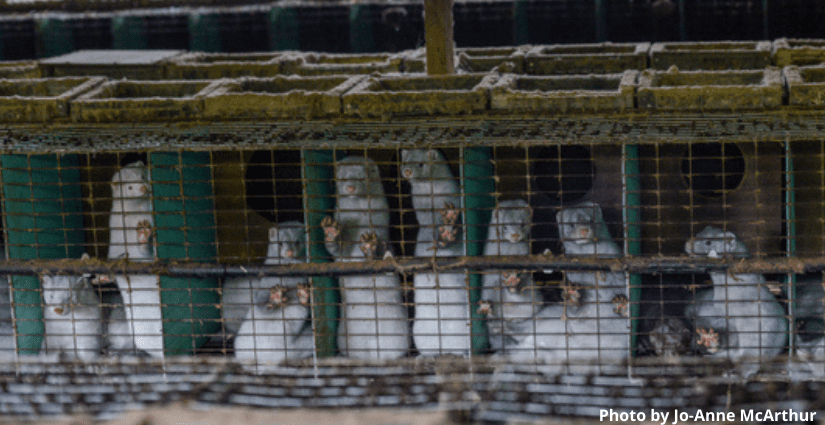The B.C. and federal governments continue to provide fur farms access to funding program to support luxury fur exports, even as COVID cases on mink farms continue to threaten human health.

News of yet another COVID-19 outbreak on a Fraser Valley mink farm this week has highlighted the danger of the B.C. government’s inaction on the issue of fur farming. The BC SPCA, the Union of British Columbia Indian Chiefs (UBCIC), concerned infectious disease specialists, The Fur-Bearers, and Humane Society International/Canada are again calling on the provincial government to follow the lead of other nations who have ended fur farming in their jurisdictions.
“In the summer of 2020 we began warning the provincial government of the dangers of COVID transmission on B.C. mink farms,” says Dr. Sara Dubois, the BC SPCA’s chief scientific officer. “Not only is this industry inhumane – causing immense suffering to animals who are raised and killed solely for pelts sold to luxury fashion customers overseas – but these farms are posing a threat to the health of British Columbians.” Dubois adds that B.C. residents may not be aware that these farms received $6.5 million from a provincial and federal government funding program called AgriStability.
Through AgriStability, mink farmers were paid $6.5 million since 2014, of which $2.6 million came from the B.C. Ministry of Agriculture. While AgriStability is meant to act as an insurance program, which farmers pay into to help them through unexpected market fluctuations, the primary purpose is to support farmers who provide food for Canadians. Farmers who receive a payment from AgriStability can receive much more than their program fees, even after participating for several years. This is money that could have gone to other farmers or even other government initiatives.
The province currently has 11 fur farms in operation – 10 mink farms and 1 chinchilla farm. All mink farms are located in the Fraser Valley.
Dr. Dubois says the BC SPCA and other coalition members made repeated attempts to convince the government to take action on the issue of fur farming during the past year. “Since January we met twice with government officials and were assured that change was coming, but that was clearly not the case,” she says. “It is extremely frustrating because we made it clear that changes would have the most impact if they were made before breeding season. Now breeding has occurred and with all the new babies on these farms this inaction has multiplied both the danger to human health and the suffering of the animals.”
During the past year, more than 400 outbreaks of COVID 19—and mutations of the virus—have occurred on fur farms globally. More than 20 nations, including Belgium, Japan, the Netherlands, and the United Kingdom, have already taken decisive action to stop fur farming in their jurisdictions.
“Clearly the measures put in place by the B.C. government have failed to prevent COVID-19 outbreaks on large mink breeding facilities,” says Dr. Jan Hajek, infectious diseases specialist at Vancouver General Hospital. “Given the very real threat of viral mutations and transmission of the virus between animals and people in these facilities, the B.C. government should now act decisively, prohibit and end industrial fur farming in the interest of public health and animal welfare, and provide mink breeders with financial assistance and support to transition out of this industry.”
The Food and Agriculture Organization of the United Nations (FAO), the World Organisation for Animal Health (OIE), and the Word Health Organization (WHO) published a risk assessment for fur farms, identifying Canada as having a “very likely” likelihood of introduction and spread of SARS-CoV-2 within fur farms, and a “likely” likelihood of transmission of the SARS-CoV-2 virus from fur farms to susceptible wildlife populations.
Grand Chief Stewart Phillip, president of the Union of B.C. Indian Chiefs, said the union is renewing its call to end fur farming in B.C. “This industry not only goes against our values of wildlife stewardship and conservation, but also has proven to be an unmanageable threat to public health. The unnecessary and deeply troubling suffering minks are subjected to — lifelong confinement in cramped and filthy cages — only promotes the spread of COVID-19 and other respiratory viral infections.”
Lesley Fox, executive director of the Fur-Bearers, said “Despite repeated calls for the B.C. government to stop restocking of fur farms in the wake of COVID-19 outbreaks, no action was taken. This latest outbreak is a direct consequence of government catering to industry interests at the expense animal welfare, public health, and the B.C. economy. The B.C. government must act now to shut down this industry for good.”
Kelly Butler, Humane Society International/Canada wildlife campaigner, stated “The world community is taking urgent action to end fur farming because it is inherently inhumane, environmentally destructive, and poses a grave public health risk. The B.C. government must follow the lead of these nations and end this high risk, outdated and needless industry.”
Dr. Dubois notes that a 2020 poll conducted by the public opinion firm Research Co., found that 85% of the population of B.C. are opposed to killing animals for their fur. “Having been on these fur farms and seen the conditions firsthand, I can attest that the practice is inherently inhumane and subjects animals wild in nature to treatment that no B.C. resident would tolerate,” says Dubois. “Fur farming exists in direct opposition to the values of British Columbians.”
Please voice your concern to government today to end fur farming in B.C.
Share this news item on Twitter and Facebook:


